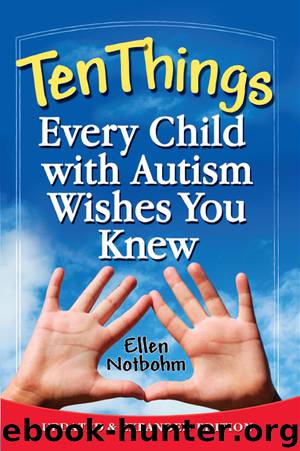Ten Things Every Child with Autism Wishes You Knew by Ellen Notbohm

Author:Ellen Notbohm [Notbohm, Ellen]
Language: eng
Format: epub
Publisher: BookBaby
Published: 2013-06-07T04:00:00+00:00
Chapter Eight
Help me with social interactions.
We can be blunt with each other here. Kids with autism or Asperger’s frequently stand out as social oddballs. The heartbreak it caus es, to the child and to the parent, stirs in many parents an intense need to fix that facet of their child. If social competence was a physiological function, we could throw medication, nutrition, exercise, or physical therapy at it and make it happen. If kids with autism were curious, outgoing, motivated learners, we could cultivate social intelligence curriculum-style.
Too often, our kids aren’t like that, and social awareness isn’t a set of concrete, itemized skills. Basic manners (please and thank you, use tissue, not sleeve, wait your turn) can and should be taught, regardless of the child’s level of function, but learning to be at ease among others in the bustle and nuances of daily life is infinitely more complex. Social skills (behaviors we want our child to exhibit) are the end product of an intricate organism of developmental elements we call “social thinking.”
Just as we all have to learn to walk before we run, we must teach our children to “think social” before they can act social, with understanding and positive intent, not just by rote repetition or in fear of consequences. Social thinking presents your child with the challenge of factoring context and perspective into his actions—to consider the physical, social, and temporal aspects of his surroundings, to take into account the thoughts and viewpoints of others, to use shared imagination to connect with a play partner, and to comprehend that others have favorable or not-so-favorable thoughts and reactions to him based on what he says and does. Social thinking is the source from which our social behaviors spring, and this social-emotional intelligence may be a bigger determinant in a child’s long-term success in life than cognitive intelligence.
Parent or teacher, home or school, teaching a child with autism to think social begins with chucking any assumptions you may harbor about his ability to absorb social sensibility by simply being around and observing socially adept people, or that he will somehow, someday outgrow his social cluelessness. To date, our education system has based curriculum standards on the flawed supposition that all children enter the world with an intact social processing brain and on a presumed social developmental progression. It makes no sense (and is grossly unfair to the child) to respond to a child’s social snafus based on such assumptions and then blame his autism when our attempts to teach don’t register with him. What our children need is for us to shift perspective and start building their social awareness at its roots.
When we say we want our child to learn social skills, we’re really reaching for something grander. We want him to be able to fit into the world around him, to function independently at school, in the community, at work, and within his personal relationships. Bryce stated this goal from early adolescence and, he told me, it had always
Download
This site does not store any files on its server. We only index and link to content provided by other sites. Please contact the content providers to delete copyright contents if any and email us, we'll remove relevant links or contents immediately.
The Out-of-Sync Child by Carol Stock Kranowitz(2054)
The Gender Creative Child by Diane Ehrensaft & Norman Spack(1794)
Aspergirls by Rudy Simone(1697)
Your Soul's Plan by Robert Schwartz(1688)
Be Different by John Elder Robison(1650)
My Child's Different by Elaine Halligan(1516)
101 Tips for the Parents of Boys with Autism by Ken Siri(1495)
Meditation: Meditation For Beginners - How to Meditate For Lifelong Peace, Focus and Happiness (Mindfulness, Meditation Techniques) by Price Sara Elliott(1448)
The Sensory Child Gets Organized by Carolyn Dalgliesh(1447)
Asperger Syndrome (Autism Spectrum Disorder) and Long-Term Relationships by Ashley Stanford(1426)
ADHD by Mark Selikowitz(1393)
An Adult with an Autism Diagnosis by Gillan Drew(1354)
Nerdy, Shy, and Socially Inappropriate by Cynthia Kim(1350)
Animal-assisted Interventions for Individuals with Autism by Temple Grandin(1330)
The Yoga Bible by Christina Brown(1324)
Seeing Ezra by Kerry Cohen(1305)
Somebody Else's Kids by Torey Hayden(1264)
Baby Signing for Dummies by Jennifer Watson(1260)
The Complete Guide to Asperger's Syndrome by Tony Attwood(1239)
